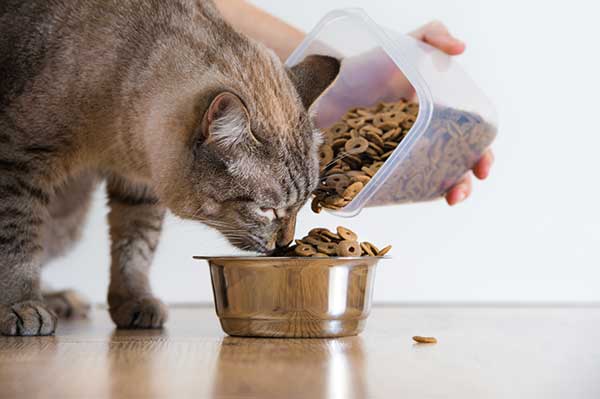According to most cat owners, choosing cat food is one of the easiest things to do.
After all, you only need to find a reputable pet food brand, head down to a store near you that sells products by that brand, and purchase the cat food. And when you get back home, you can freely offer the food to your cats regardless of their age, right? Wrong!
The nutritional requirements of an adult cat are quite different from those of a kitten. So, before you readily serve your mature cat kitten food, there are a few things that you must know. And that begs the question, can you feed your senior cat kitten food?
It’s not recommended to feed kitten food to your adult cat. While there are no immediate health concerns to be worried about, kitten food is formulated with certain ingredients that might be a bit harmful for a mature cat.
You may be a cat owner and always wondering, my cat keeps eating my kitten food, is it okay or will the cat get sick?
Read on as we delve deeper into the question of kitten food for adult cats.
Table of Contents
A Comparison Between Kitten Food vs. Cat Food
Is it dangerous to feed a senior cat kitten food?
As we’ve already indicated, kitten food is not immediately harmful to adult cats. But it’s not healthy either.
In order to understand the possible effects of kitten food for mature cats, we will briefly go through the differences between kitten food and adult cat food.
First up, it’s worth noting that by kitten food, we don’t mean the kitten formula that’s normally prescribed for cats under four weeks, which may have been detached from their mothers.
Instead, we’re referring to foods for cats that can already eat solids. As soon as cats are weaned off milk, they are introduced to wet food that’s specially formulated for kittens.
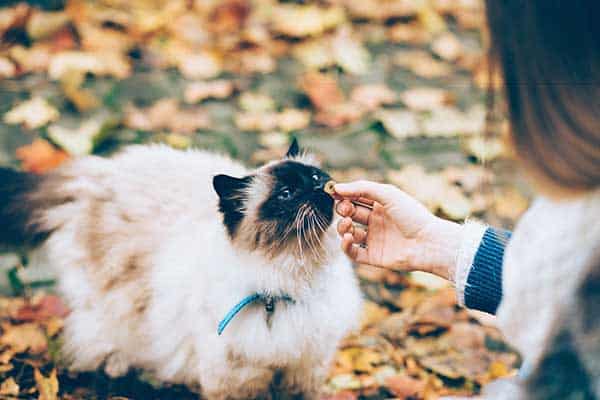
Now, the main defining feature of kitten foods is their abundance in fat, calories, and proteins. According to the United States Food and Drug Administration, an ideal kitten food should contain at least 8% fat and 22% protein. So, does kitten food have more calories than adult cat foods?
Yes, it does. However, the high calorie content in kitten food isn’t entirely bad.
As your kitten is still growing, it requires an abundance of these three essential minerals to sustain the growth and development process.
Another reason for the high fat and calorie content in kitten food is that most kittens are highly playful. During their playtime, they tend to convert a lot of calories into energy. So, the fat and calories in their foods act as energy substrates.
On its part, protein forms the building blocks for your kitten’s cells, tissues, and muscles. Protein deficiency in kittens might lead to a wide range of medical conditions.
But besides these three essential dietary elements, kitten food should also contain a considerable amount of other minerals and vitamins that facilitate growth, including calcium, magnesium, potassium, and phosphorus.
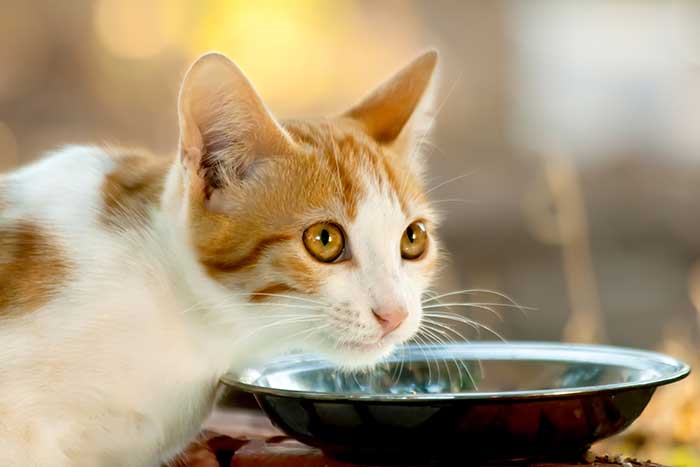
As for adult cats, the FDA recommends that their foods contain 5% fat and 18% protein. Generally, adult cats should consume more protein than carbohydrates or lipids. That’s because the digestive system of cats isn’t well-adapted to processing carbohydrates.
According to vets, your adult kitto should consume between 2 and 3 times more protein than an omnivorous animal of the same size.
One reason why adult cats require more protein is that they’re obligate carnivores. Therefore, they obtain most of their nutritional requirements from a diet of animal protein.
But even adult cat foods vary in terms of their dietary profiles. Some contain as low as 30% protein, while others can pack as high as 50% protein.
As we’ve mentioned, the convention is to choose adult cat foods that come with higher protein, such as canned foods. And while you’re at it, also keep an eye out on other minerals and vitamins.
So, before buying cat food for your mature kitto, take some time investing in reading up the ingredients list.
Having reviewed the fundamental differences between adult and kitten foods, you might still be wondering, can I feed my older cat kitten food?
Read on for more insights into that.
Last update on 2025-01-29 / Affiliate links / Images from Amazon Product Advertising API
Which Cats Should Eat More Calories And Which Ones Shouldn’t?
One of the common concerns among many cat owners is, my cat only wants to eat kitten food and I’m concerned about the high calorie content in it.
As a responsible cat owner, you have all the reasons to be worried about feeding the high-calorie kitten food to your mature cat.
However, you need not fret, provided you know how to determine the recommended daily intake of calories in cat food for both kittens and adults.
Generally, an adult cat should weigh an average of 11 pounds. And for that weight, the cat should consume between 250 and 350 calories. You can stagger the amount of calories you give to your cat, depending on the changes in its weight and activity level.
Besides kittens, high-calorie foods are also recommended for pregnant or nursing cats, as these cats need a lot of energy to go around.
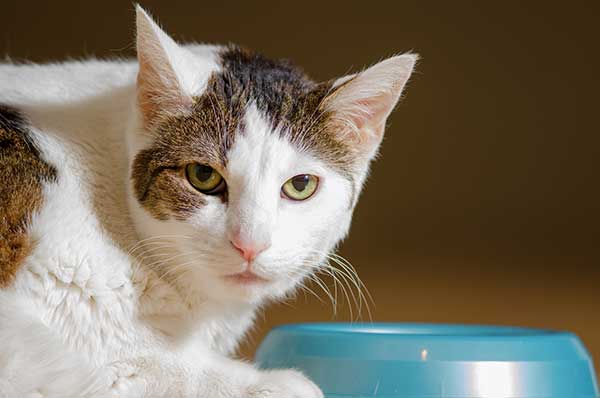
However, cats that are physically inactive or those that are already showing visible signs of obesity should not eat high-calorie foods. The same goes for older cats.
So, you may have been wondering, can older cats eat kitten food and will kitten food hurt my cat?
Kitten food might hurt your older cat, and the one ingredient to be wary of is fats.
Fats lead to obesity, and obesity predisposes your feline friend to a wide range of medical conditions, including diabetes, arthritis, and hepatic lipidosis. So, whichever way you look at it, feeding kitten food to older cats isn’t a great idea.
Why Does My Cat Like Kitten Food?
Much as we’ve condemned kitten food for mature cats, it might happen that your cat likes kitten food a lot. But still, that doesn’t make kitten food safe for your adult cat. In fact, the chances are that the cat doesn’t like the food at all.
Mature cats have a way of expressing dominant behavior when they’re around kittens. So, your adult cat might snatch the food from the kittens just to assert its dominance. It could also happen that your cat simply loves the smell of kitten food.
All in all, it’s important to leave kitten food to kittens and get your adult cat mature cat food.
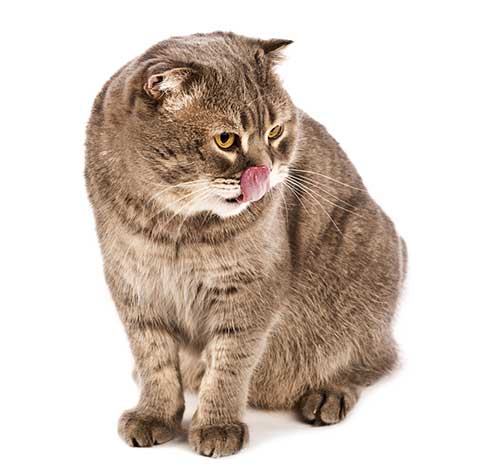
Top Kitten Food Products
One of the best recommendations for kitten foods is this Fancy Feast Pate Wet Kitten Food. The product is formulated with essential minerals and vitamins to support the growth and development of your cat.
There’s also the Blue Buffalo Wilderness Kitten Variety Pack, a grain-free, poultry-free, and salmon-enriched kitten food that’s as delicious as it’s nutritious.
Lastly, we have the Purina Pro Plan Focus Pate Wet Kitten Food that’s made with real liver and chicken to whet your kitten’s appetite, while nourishing its immune system.
Conclusion
So, can adult cats eat kitten food?
Still, the answer is – not recommended. Your adult feline friend will unlikely wind up in a hospital bed after snacking on kitten food. But there are long-term health implications to watch out for.
Checkout Our Favorite Cat Products
1. Best Online Course For Cat Parents
Our favorite: The Cat Language Bible (How to Finally Undrestand And Speak to Your Cat) – A new form of cat to human communication that many cat owners have dreamed about… but few have actually thought possible.
2. Best Vacuum to Tackle Pet Hair
Our favorite: Dyson Ball Animal 2 – Engineered for homes with pets. With features and tools that dig out dirt, hair and allergens everywhere your pet gets.
3. Best Immune Support For Cats
Our favorite: Tomlyn Immune Support – Best Supplement for Cats and Kittens.

